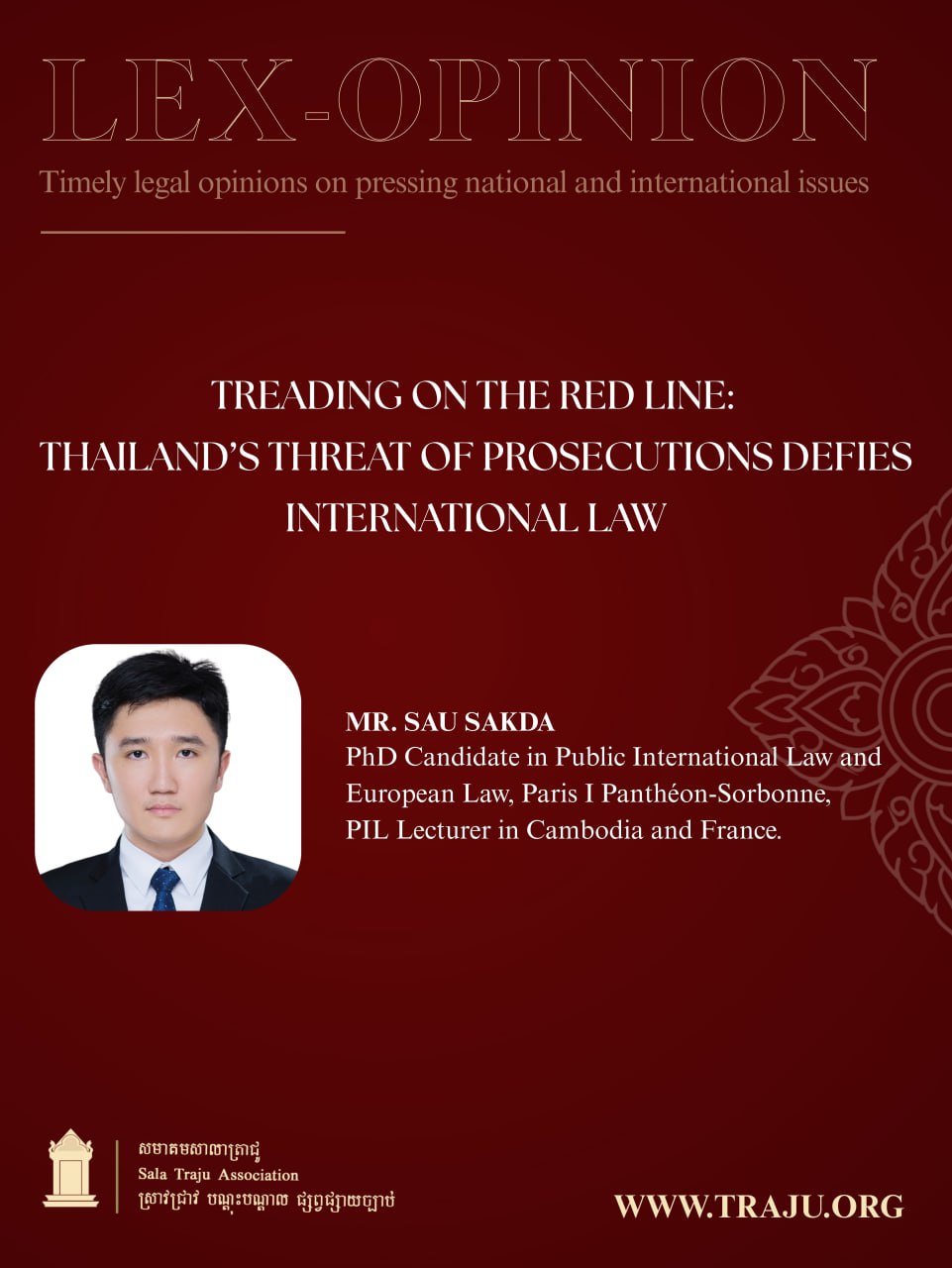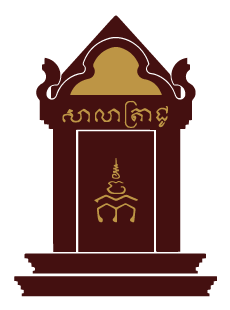
By Sakda SAU
Thailand’s threat to prosecute Cambodian leaders is legally unfounded and politically reckless. By entertaining the prospects of national prosecutions and invoking the International Criminal Court without legal basis, Bangkok undermines both the spirit of international law and the fragile ceasefire meant to keep peace along the border. Recently, according to the post of the Nation Thailand dated 19 August 2025, the Acting Prime Minister of Thailand, Phumtham Wechayachai, made a statement regarding the preparation of Thai domestic legal actions against Cambodian leaders. According to an article by Khaosod dated 19 August 2025, he further added that “the lawsuit against Hun Sen and Hun Manet […] could still be brought before the International Criminal Court (ICC) as war criminals, if conditions permit”.
Two statements, devoid of legal foundations, made by Thailand’s acting prime minister are an affront to long-standing customs in international relations and to basic principles of international law. It is unimaginable that a Head of government could publicly announce those words toward a neighbouring country’s counterpart. Unimaginable not only from a diplomacy perspective, but also from a legal perspective. While States are expected to respect the principle of good neighbourliness as enshrined in the Preamble of the Charter of the United Nations (UN), consisting of practicing tolerance and of living together in peace with one another as good neighbours, Thailand is now walking in the opposite direction by undermining the efforts of the international community in drawing up the ceasefire on 28 July 2025. In addition to the aggression in violation of Cambodia’s territorial integrity and to the unwillingness to resolve the conflict peacefully, Thailand’s preparation to lodge legal actions against Cambodian leaders calls into question Thailand’s willingness to uphold the ceasefire and to respect international law. Both prosecutions, either before Thai national courts or ICC, could not be done legally, unless it is conducted in contravention with international law.
Thailand’s legal actions are in violation of Cambodian leaders’ immunities.
Any legal actions lodged by Thailand against Cambodian leaders, especially the Head of government, cannot be done due to their immunities. Par in parem non habet imperium (equals have no sovereignty over each other) or the principle of sovereign equality is enshrined in article 2(1) of UN Charter and it also forms the basis for the doctrine of State immunity. Not only the State itself, but also some State representatives are also protected by immunities.
International law protects sitting heads of state and government from prosecution abroad, even for alleged crimes. During their period of service, those persons are protected, due to their official capacity, against any prosecutions relating to their acts, including those performed in their private capacity. This immunity is absolute under the prevailing views of international law, since in this respect good relations between States and international stability take precedence over securing punishment for international crimes. This immunity does not exist to shield individuals for their own personal advantage, but to ensure the effective functioning of their offices for the State that they represent. Thailand’s threats could tear at this principle. Undermining these long-standing customs in international relations defeats the spirit of trust and co-existence between States. As neighbouring countries, rather than nurturing mutual understanding and peace, those threats to take legal actions nurture distrust and hostilities between the two countries. Such action is blatantly illegal from the outset, ranging from the act of national courts to prosecute, to the possible issuance of arrest warrant. Samdach Thipadei Hun Manet is therefore protected by personal immunity against any prosecution by Thai national courts.
At first glance, Samdach Techo Hun Sen might appear not to benefit from immunity in his current role as Senate President. However, international law also protects State officials from prosecutions relating to any activities or acts performed in the exercise of their official capacity. Functional immunity protects State officials even if they are no longer holding their positions. From the statements of Thailand’s acting prime minister, the accusation seems to rest on alleged war crimes committed during the border conflict. However, acts of Samdach Techo Hun Sen during the conflict are acta jure imperii (sovereign acts) that are hence covered by functional immunity. A royal letter of 4 August 2025 delegated to Samdach Techo Hun Sen authority over defence and sovereignty matters, confirming these were sovereign acts protected by functional immunity under international law.
This immunity also does not mean impunity. However, no exceptions for international crimes have been generally recognized under international law. A general exception may risk creating the possibilities of judicial instrumentalisation or harassment by foreign courts, hindering the effective functions of State’s high-ranking officials.
The Royal Government of Cambodia (RGC) have always been committed to resolving disputes on the basis of international law. This unwavering dedication to peaceful resolution is evidenced with previous Preah Vihear cases before the International Court of Justice and willingness to bring the current border conflict before that same court. After three decades of civil wars, Cambodia also became a member of the ICC since 01 July 2002 ensuring that the Court has jurisdiction on any international crime committed on its territory, ensuring long-lasting peace in the country and the region. Thailand, however, chose a different path in resolving the current conflicts, as evidenced in its intention to refer the situation of border conflict to the ICC despite not having ratified the Rome Statute of the ICC.
There is no legal basis for Thailand to refer the situation of border conflict to the International Criminal Court.
Thailand’s sanctimonious attempt to refer the situation of border conflict to the International Criminal Court (ICC) is merely an empty threat devoid of legal basis. While Cambodia has recognized the importance of punishing the most serious international crimes and has been a State Party to the ICC since 01 July 2002, Thailand, on the other hand, signed the Rome Statute on 2 October 2000, but has not ratified it since then preventing it from entering into force in Thailand.
Thailand planned to initiate a lawsuit against Cambodia’s leaders despite not even being a State Party to the ICC. However, the ICC does not accept lawsuits; only referrals of situations are possible. Under article 14 of the Rome Statute, only a State Party can refer to the ICC Prosecutor a situation in which one or more crimes within the jurisdiction of the Court appear to have been committed requesting the Prosecutor to investigate the situation for the purpose of determining whether one or more specific persons should be charged with the commission of such crimes. As a signatory and not a State Party to the ICC Statute, such possibility of referral is not opened to Thailand. One cannot arbitrarily pick and choose applicable international rules according to each situation.
Thailand’s discourse on referral to the ICC is inconsistent and hypocritical in two ways. First of all, Thailand’s pretext of not bringing the case to the International Court of Justice (ICJ) is because other means of peaceful resolution are still available. Yet, the facts show that bilateral negotiations have been futile to a point that clashes occurred along the borders. Rather than accepting the Courts’s jurisdiction as proposed by Cambodia after the incidence dated 28 May resulting in the death of one Cambodian soldier in Mom Bei area, Thailand’s dispute resolution mechanism remains the language of guns and bombs. Secondly, Thailand rejects binding adjudication while at the same time instrumentalizing the ICC narrative for political gain.
With the recent statements from Thailand’s acting prime minister and Lieutenant General Boonsin Padklang, these actions promote distrust between the two countries. This goes to show the unwillingness of Thai government to resolve the border conflict through peaceful dispute settlement. If Thai’s legal actions were to be put forward, these courtroom theatrics will be done at the expense of peace in the region.
Conclusion
If Thailand persists in turning the courtroom into a battlefield, it risks destabilising fragile peace. The priority must be to honour the ceasefire, return 18 Cambodian soliders captured after the ceasefire, and recommit to diplomacy. Anything less risks dragging the region back into conflict. Lasting peace in the region depends above all on the political will of both governments to comply with international law.
Sala TRAJU Association is proud to announce the launch of “Lex-Opinion”, a new initiative designed to deliver clear, concise, and timely legal opinions on pressing national and international issues.
In today’s rapidly changing environment, decision-makers, institutions, and the public need accessible and reliable legal insights. Lex-Opinion will serve as a trusted source, offering short yet substantive legal perspectives to inform debate, support evidence-based policymaking, and promote the rule of law.
With this new platform, TRAJU reaffirms its commitment to advancing legal understanding, fostering dialogue, and ensuring that complex legal questions are addressed with clarity and authority.
